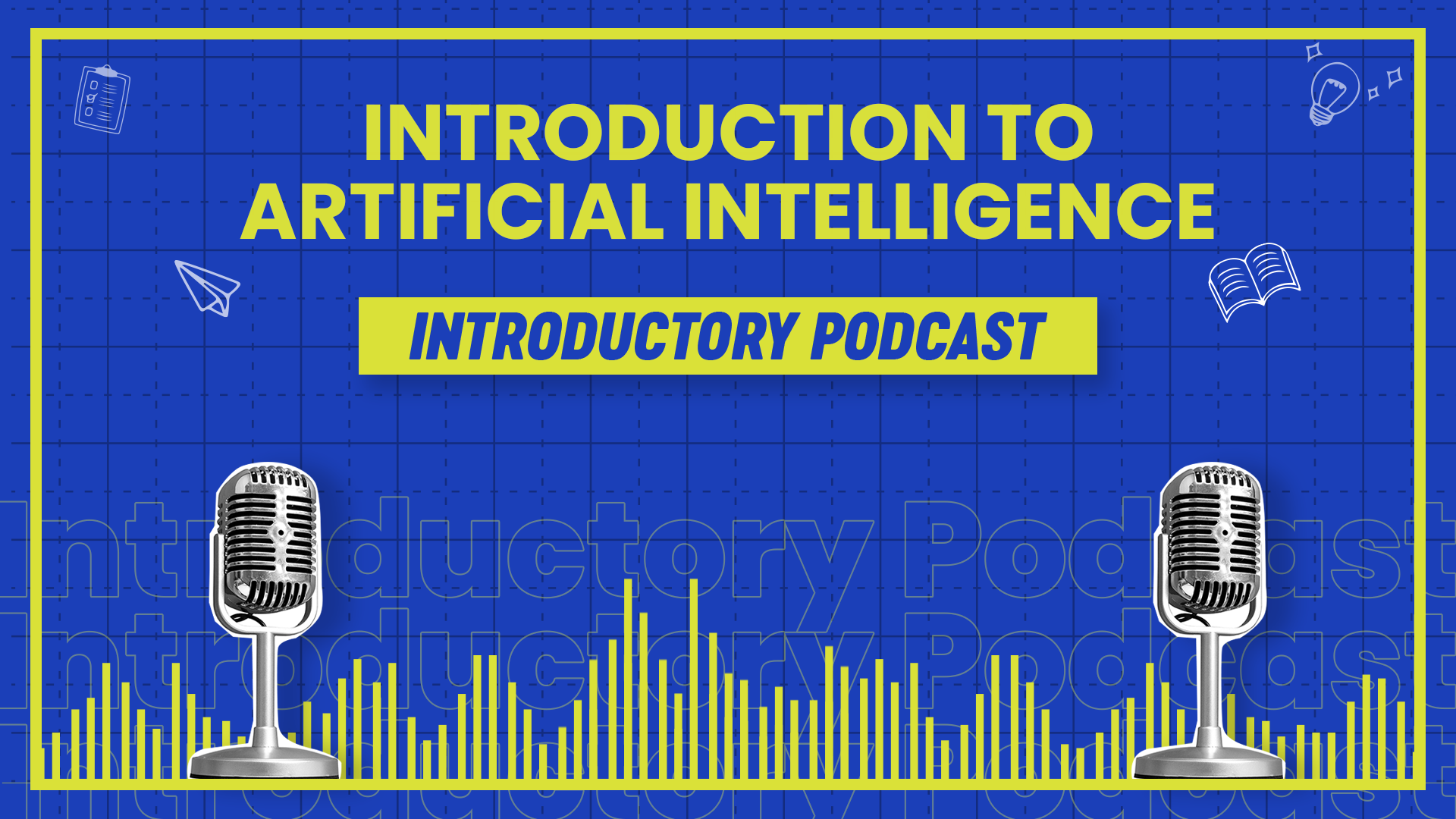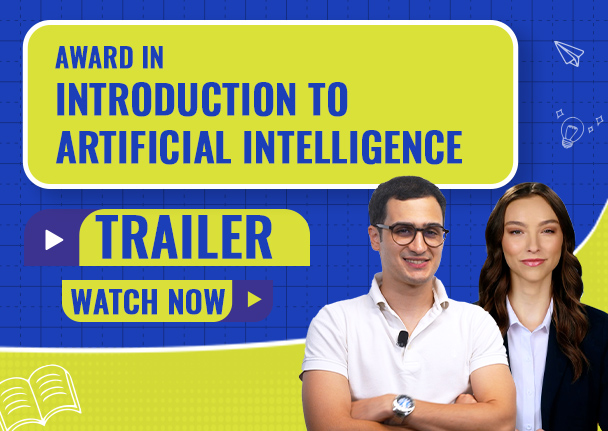Award in Introduction to Artificial Intelligence
Introduction to Artificial Intelligence (AI) module covers the fundamental concepts, theories, and techniques of artificial intelligence.
-
OrientationDirector’s Introduction03:27Orientation10:52Understanding Podcasts01:46Understanding Pre-recorded Lectures02:25Understanding Pre-recorded Interviews01:54Understanding Case Studies01:47Understanding Discussion Boards02:30Ascencia Style SheetAI PolicyPolicy for Online Interaction and Behaviour for E-Academic Students
-
Coursework: Introduction to Artificial IntelligenceIntroductory Podcast00:08:06
-
Section 1: Introduction and Uses of AI in BusinessPodium Lecture: Thinking Machines, Birth of AI, Philosophies and 4 Pillars of Artificial Intelligence00:36:21Lecture: Part 1: AI and Machine Learning Tools00:38:00Lecture: Part 2: AI and Machine Learning Tools00:47:37Lecture: Part 3: AI and Machine Learning Tools00:40:51Podium Lecture: The Past, Present and Future of AI00:19:19Guest Interview: Nikola Markovikj00:48:34Lecture 1: Part 1: AI, Blockchain, and Automation in Project Management01:02:12Lecture 1: Part 2: AI, Blockchain, and Automation in Project Management01:04:42Lecture 2: AI and Data Analytics in Project Management01:22:28
-
Section 2: Searches and LogicPodium Lecture: Introducing Heuristics to a Search Problem, Greedy, A*, Properties of a Heuristic00:35:49Podium Lecture: Introducing Logic and Knowledge to a Problem, Toy Scenarios, Basic Knowledge Based Agents00:40:10Podium Lecture: Using Propositional Logic to Inform the Agent, Entailment and Model Checking00:32:18Podium Lecture: Extending Propositional Logic Using First Order Logic00:45:41
-
Section 3: Technical Lectures in AI and Machine Learning; Lecture 1Lecture 1: Part 1: Introduction to Artificial Intelligence00:42:31Lecture 1: Part 2: Introduction to Artificial Intelligence00:56:27Podium Lecture: Introducing Agents that act Under Uncertain Conditions, Elements of Probabilistic Reasoning00:33:22
-
Section 3: Technical Lectures in AI and Machine Learning; Lecture 2Lecture 2: Introduction to AI and Machine Learning01:32:54Screen Recording: 2.1: Part 1: IntroMLAI_CutNeuralNetwork01:37:14Screen Recording 2.1: Part 2: IntroMLAI_Network00:42:03Screen Recording 2.1: TensorflowPlayground00:19:12
-
Section 3: Technical Lectures in AI and Machine Learning; Lecture 3Lecture 3: Data Engineering in Machine Learning01:03:00Screen Recording 3.1: Data Engineering00:38:30
-
Section 3: Technical Lectures in AI and Machine Learning; Lecture 4Lecture 4: Part 1: Supervised Learning Foundations00:31:40Lecture 4: Part 2: Supervised Learning Foundations00:36:23Lecture 4.2: Logistic Regression01:06:15Screen Recording 4.2: Logistic Regression01:16:49Lecture 4.3: Gradient Descent00:59:22Screen Recording 4.3: Gradient Descent00:40:01Lecture 4.4: KNN00:30:00Screen Recording 4.4: KNN00:32:02Lecture 4.5: SVM01:24:38Screen Recording 4.5.1: SVM00:16:23Screen Recording 4.5.2: SVM00:14:50Screen Recording 4.5.3: SVM00:18:26Screen Recording 4.5.4: SVM00:12:18Lecture 4.6: Decision Trees00:48:03Screen Recording 4.7.1: Ensemble00:22:20Screen Recording 4.7.2: Ensemble00:08:16
-
Section 3: Technical Lectures in AI and Machine Learning; Lecture 5Lecture 5: Neural Networks Foundations00:55:02Lecture 5.1: KMeans00:39:56Screen Recording 5.1: KMeans00:32:03Lecture 5.2: DBSCAN00:33:10Screen Recording 5.2: DBSCAN00:29:54Lecture 5.3: Agglomerative00:18:03Screen Recording 5.3: Agglomerative00:19:56
Introduction to Artificial Intelligence (AI) module covers the fundamental concepts, theories, and techniques of artificial intelligence. The module covers a broad overview of AI, including its history, current state, and future potential and philosophical dilemmas. Students will learn about the different subfields of AI, including machine learning, computer vision, robotics, and natural language processing, and will be introduced to the basic concepts of artificial intelligence, such as decision trees, neural networks, and fuzzy logic.
Programme Outcomes
- Develop an Understanding of AI fundamentals: Students will gain a comprehensive understanding of the core theories of AI, including machine learning, logical reasoning as well as reasoning in uncertainty.
- Knowledge of AI algorithms: Students will learn about the different AI algorithms and techniques, such as decision trees, neural networks, and fuzzy logic, and will understand how to implement and apply these algorithms in the context of logical reasoning an uncertain environment.
- Critical analysis of AI: Students will develop critical analysis skills by examining the implications of AI from multiple perspectives, including those of ethics, philosophy, and technology.
- Develop an understanding of the ethical and moral implications of AI: Students will learn about the ethical and moral implications of AI, including issues related to privacy, autonomy, and the distribution of benefits and harms.
- A Bachelor's degree or post-graduate degree in business, administration, management, or a related field
- Minimum 180 ECTS previously acquired at a Higher Education institution
- 2 years of work experience
- A GPA score of 2.5 (C+) or higher (or equivalent) will be required
- Proof of C1 level of English or equivalent
NOTE: Individuals may apply and ask for consideration to be given to considerable high level leadership experience in lieu of some of typical academic requirements
Course Syllabus Podcast
Gain a Comprehensive Understanding of the Course Syllabus with Our Informative Podcast.
- Multiple choice assessment - 30%
- Assignment - 70%
- E-portfolio
- You can submit your assessment at any time during the course.
What’s included
-
Duration :Full Time - 3 Months
Part Time - 6 Months - Learning: 250 +Hours
- Blockchain Certificate

